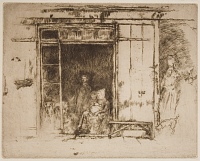Etchings Institutions search term: hunterian art gallery
Sleeping Child, Ajaccio | ||
| Number: | 488 | |
| Date: | 1901 | |
| Medium: | etching | |
| Size: | 153 x 190 mm | |
| Signed: | butterfly at upper left | |
| Inscribed: | no | |
| Set/Publication: | no | |
| No. of States: | 1 | |
| Known impressions: | 18 | |
| Catalogues: | K.-; M.-; T.-; W.- | |
| Impressions taken from this plate (18) | ||
TECHNIQUE
The figures and house-front are drawn with broken lines, and the shadows with irregular patches of diagonal shading and some cross-hatching. MacInnes writes:
'Throughout the print Whistler builds up his effects with short lines, often of great delicacy, - the weathered wood around the door, light reflected from the windows at its side - an intricate network in the shadows into which the woman at right is receding and from which the group in the doorway emerges; creating an atmosphere to which the figures contribute and of which they are an essential part.' 5
5: MacInnes 1969 , p. 336.
PRINTING
No impression of Sleeping Child, Ajaccio printed by Whistler has been located. It was printed in 1931 in a limited edition of about 25 by Nathaniel Sparks (1880-1956), who signed all the impressions on the verso. 6
Most impressions are in the Hunterian Art Gallery. They are printed in dark brown ink on ivory laid paper, a high proportion having a foolscap watermark ( ,
,
 ,
,  ) but one impression is on ivory wove paper (
) but one impression is on ivory wove paper ( ). They are not trimmed, but have a wide margin of about 50mm. Although printed in a consistent manner by Sparks, there are minor variations in inking and surface tone.
). They are not trimmed, but have a wide margin of about 50mm. Although printed in a consistent manner by Sparks, there are minor variations in inking and surface tone.
Most impressions are in the Hunterian Art Gallery. They are printed in dark brown ink on ivory laid paper, a high proportion having a foolscap watermark (
 ,
,
 ,
,  ) but one impression is on ivory wove paper (
) but one impression is on ivory wove paper ( ). They are not trimmed, but have a wide margin of about 50mm. Although printed in a consistent manner by Sparks, there are minor variations in inking and surface tone.
). They are not trimmed, but have a wide margin of about 50mm. Although printed in a consistent manner by Sparks, there are minor variations in inking and surface tone.6: Martin Hopkinson, 'Nathaniel Sparks's Printing of Whistler's Etchings', Print Quarterly, 1999, Vol. 16, No. 4, pp. 340, 346, 352.
